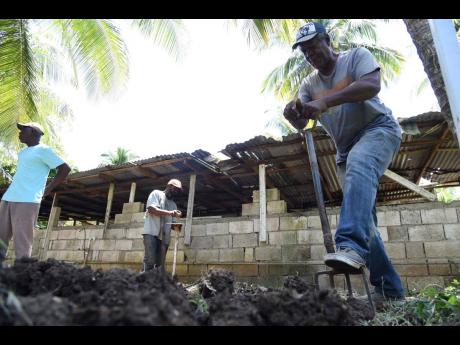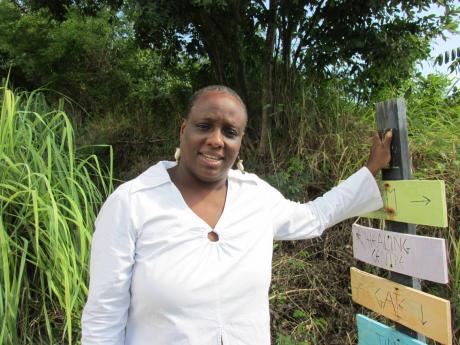‘We’ve missed the boat again’
Organic farmers call for more help to ramp up production
Local organic farmers are lamenting the challenge to locate and acquire approved biodegradable products for organic farming – including seeds, weedicide and biofertilisers – which is stunting growth in the sector.
St Thomas farmer Leslie Anderson, who has been in the sector for more than four decades, told The Gleaner that organic agriculture was the purest form of sustainable farming, but organic farmers were finding it difficult to maintain large-scale operations due to the challenges with sourcing.
As a result, he is only able to dedicate a small section of his 20-acre intercropping farm in Needham Pen, St Thomas, to organic crops.
In other instances, Anderson collects the excrement of animals and incorporates it with mulch and soil to allow for it to break down and become nutritious to plants.
“Whatever you plant in them, they have a different texture, a different taste and a longer shelf life. So, because it takes so much time, that’s why organic stuff is so much more expensive, but for us in the country, we don’t have a fixed market for stuff like that,” Anderson said.
He stated that while mulching – the process of covering the topsoil with plant material for weed control and retaining soil moisture – and composting – a mixture of organic materials to make a nutrient-rich plant fertiliser – were great techniques to use in organic agriculture, which he practised on his farm, there were other biofertilisers that could be used to aid with balancing the pH content of the soil and plants.
“Even though I am a member of the Jamaica Organic Agriculture Movement (JOAM), it is still difficult, because for instance, we are aware of the dangers of bringing in seeds [that might have] diseases into the country, which can be devastating to what we have here, but [with the] approved seeds that can import, it’s a long tedious process [to get them],” he said of small-scale farmers.
Anderson further bemoaned a lack of appreciation in society for organic farming and its products, especially due to the economics of it, given that such produce are sold at higher price points.
“But you have people who know the value of it and will pay for it,” he added.
Organic farming has been touted for generating safer and more nutrient-dense foods while helping to maintain healthier soil. It helps to reduce the risk of soil erosion and contamination of water sources.
MANY LOST OPPORTUNITIES
Nicola Shirley-Phillips, immediate past president of JOAM, told The Gleaner last Wednesday that organic farmers want the Government to give the sector a greater push by rallying behind them and engaging in public-education campaigns about the benefits of organic foods.
JOAM is a non-profit, non-governmental organisation established to promote the improvement of the organic agriculture industry in Jamaica.
“We don’t make changes until it’s crisis time and it’s such a shame. We need to be more visionary and see what’s going on with the trends, and the trends don’t just happen overnight; the trends are there,” she said.
The president added that the nation has lost out on numerous opportunities to earn through the organic sector over the years.
“We talk about economic growth and stuff like that, but we’ve lost money ... You think about it, Jamaica is the first place that say ‘ital’,” Shirley-Phillips said, referring to a term often used by Rastafarians to promote clean and healthy food consumption.
“We’ve missed the boat again ... We should be leading in the Caribbean in terms of having a number of products which are organically grown and a large number of farmers that are moving in this direction,” she said.
She further lamented the lack of organic farmer’s markets in Jamaica, saying that the Ujima Natural Farmers Market at Hope Gardens in St Andrew on Saturdays was the only place for organic food lovers to shop.
“That is madness,” she exclaimed, noting that individuals have to travel from other parishes to get verified organically grown products.
She is lobbying for at least one organic market in each parish.
She said that in past times, there was not much support for the sector as most people within the Ministry of Agriculture and its agencies, such as the Rural Agricultural Development Authority, were trained in traditional farming practices involving chemicals and would often only recommend these methods.
Although JOAM has assisted in organic farming training, many farmers tend to return to the methods they had been accustomed to.
Shirley-Phillips expressed that while some organic farmers want to expand their farms to 20 or 30 acres, the lack of a steady supply of biochar, soil conditioner, compost, biofertiliser and other organic solutions makes this difficult.
She explained that JOAM is working with the agriculture ministry to execute a soil fertility plant project, which will see members travelling across the island to expose farmers to 11 strategies to improve soil health. This week, an official agreement is expected to be signed by both parties and the project gets under way by August, she added.
“Every country’s wealth is based on its soil ... Everything comes from the earth through the soil, so we now, on the island, should be rebuilding our soil,” she said.
Shirley-Phillips said that chemically grown fruits and vegetables were only beautiful on the outside, “so we think what we’re eating is something good, but is nutritionally causing our own destruction”.
Paul Campbell, an agriculture extension officer at the RADA’s Morant Bay office, said at a recent meeting of the Kanga Gully Farmers Group in Nutts River, St Thomas, that he would be organising a training course in biofertiliser production and nutrient management early this month, adding that he was also looking forward to partner with JOAM in the effort.
Last week, Agriculture Minister Pearnel Charles Jr announced that the RADA is to undertake a $30-million pilot project for composting and organic fertiliser production on farms across the island. Farmers will be trained and the fertiliser will be used on the pilot farms and will then be distributed to other farms as production increases.


